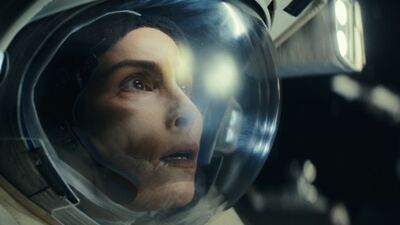One character at odds with the mission is Commander Henry Caldera (Jonathan Banks). Above the safety of the astronauts, he’s obsessed with the retrieval of the experiment that might have influenced the trouble on the ISS. Banks, having shown his quietly menacing demeanor throughout his career on shows like “Breaking Bad,” is the ideal actor for this calculating character. Like some of the other dual roles in “Constellation,” he gets to play double duty as Bud Caldera, an astronaut whose life trajectory altered significantly after a controversial space mission. The first introduction to this doppelganger reveals he’s an old curmudgeon working the convention circuit. A much different status than his counterpart Henry.

These early episodes are easily the most thrilling part of the series, with an emergency crash landing from a failed space shuttle sharing a lot of DNA with 2013’s “Gravity.” From there, “Constellation” struggles to maintain its momentum. As a thrilling space adventure, it fails to deliver constantly engaging threads to follow. Of course, the Russians have space secrets. Why should we care about this mysterious MacGuffin that has Banks’ character so preoccupied? And let’s not even get started about the convenience of a working Fisher Price cassette player that ends up being a key element of the series. The plot contrivances do the “Constellation” no favors.
Much like Jo’s constant questioning of her reality, “Constellation” frequently alters viewpoints and timelines to suit its narrative too. It’s disorienting and designed to put audiences in a state of confusion like its protagonist. After all, most of the series hinges on Jo’s mental acuity. One frequently used gimmick of “Constellation” is that a character will see an event transpire in front of them and then that scene will be revisited with an alternate perspective. The intent is there, but the payoff never justifies the means. When used sparingly these alternating perspectives can illuminate certain scenes; when the series uses it as a crutch, the disorienting nature of the story loses some of its charm. It’s fine for the characters to be lost within the story, but there needs to be something that grounds the events.

